Geekscape After Dark presents Deep Inside Trading!
Welcome to Geekscape After Dark, where a film student who can barely balance his own checkbook is going to talk about the economy the only way he knows how: by reviewing pornography.
I have absolutely no experience or expertise in economics, but since the economic collapse something-something months ago it’s been inescapable. The news, the movies, and even the once blissfully ignorant internet are all tripping over themselves to provide information and analysis about the latest way that people are getting screwed, making it only natural to give it a whirl in a pornographic review. In the interest of starting off on the right foot, let’s start with what I’ve been able to glean from various blogs:
The economy, it turns out, is bad. It used to be good, but now it’s bad. Democrats say it’s because of Republicans, and that we can solve all of our problems by doing democratic things from now on. Republicans are a little hazy on whose fault it is, exactly, but they do know that everything will change for the better if we don’t do anything differently.
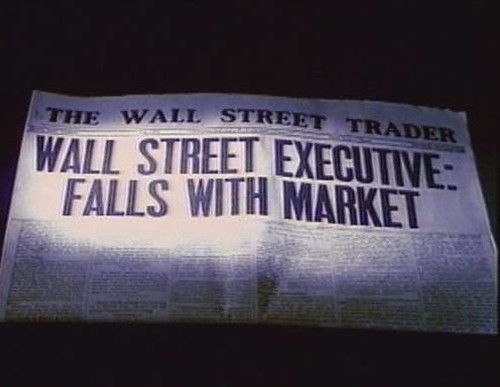
Porno movies frequently contain improper colon use.
We know the economy is bad because of the stock market, which according to The Daily Show is a completely meaningless system when viewed objectively. Of course, The Daily Show also says that about the economy itself, which means that all of our problems might just go away if we can get everyone in the world to read the Wikipedia page for Schrodinger’s Cat (which has less to do with that kid who plays the piano in Peanuts than I originally thought).
All of our economic problems, according to Huffington Post, originated in the 1980’s as a result of something called Reaganomics, which we were apparently hooked on even though apparently it didn’t work for any of us. Oliver Stone’s Academy Award-winning film Wall Street was released in 1987 at the height of Reaganomics, which would ordinarily make it the perfect film from which to analyze all of our economic woes. But since Larry Revene’s Deep Inside Trading was released three years earlier in 1984 we can safely assume that Oliver Stone’s film was merely a retread and can safely be ignored (which is a good thing because Wall Street has a lot less sex in it).
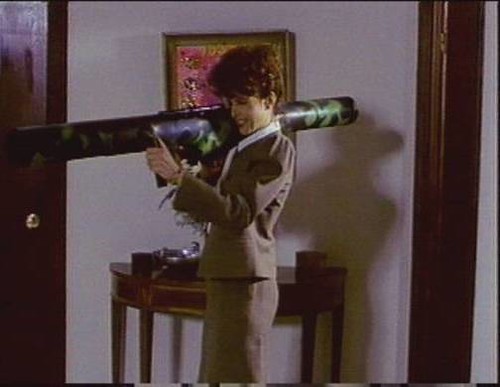
Another day, another gun lobbyist.
Deep Inside Trading’s title has two meanings. First, it indicates that the film is about trading, and that during its brief running time (barely an hour) we will venture deep inside of this mysterious world of trading, which the economy itself is supposedly based on. Second, the title suggests that not only is the film about “inside trading,” but that “inside trading” itself is “deep,” and therefore rife with philosophical complexity.
It is important to remember that Deep Inside Trading was made during the 1980’s, when certain things were different than they are today. People listened to rap music, for example. Foreign relations with Iran were prominent in the news and Nintendo videogame consoles were outselling all of their competitors. The flashy CGI-heavy title sequences that dazzle us so consistently today were predated in Deep Inside Trading by an opening title sequence that was also computer generated, albeit apparently by a Speak & Spell.
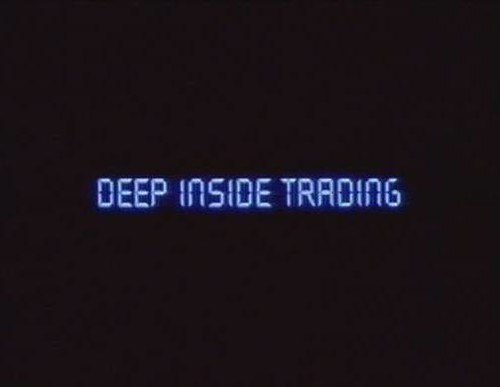
“How about a nice game of chess?”
“No thanks. Let’s play Thermonuclear Economic Meltdown.”
The film opens with two Wall Street traders (Krista Lane – Mad Jack Beyond Thunderbone; Rick Savage – The Porn Birds) engaging in the now-common act of multitasking, fornicating with vague passion while fielding calls on their separate phone lines. Apparently, depending on the situation, these traders need things to be “bought” (gained via the exchange of currency) or “sold” (given away in exchange for currency). The economy, we can determine, is driven by rich white people intent on screwing each other, as evidenced by their dialogue, which contains expressions like “controlling interest,” “when the merger goes through,” and “Tell the Ayatollah that we’ll get him the Migs by Friday and he can have the blonde girl he likes from the movie.” Which movie? Well, the highest grossing films of 1984 were Beverly Hills Cop, Ghostbusters and Indiana Jones and the Temple of Doom, but since only the latter featured a blonde actress prominently, we can safely say that 1984 was a bittersweet year for Kate Capshaw.
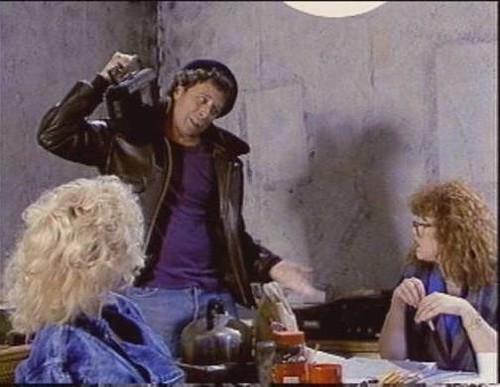
Our suspicions that inside trading, deep or otherwise, is a bad thing are quickly confirmed when a series of newspaper articles rush at the camera. (Take a moment to appreciate this once-glorious trend in exposition, because thanks to “the economy” we are unlikely to see it ever again.) Apparently a number of stock market people are killing themselves because of things happening on the stock market. My personal favorite is the guy lying face-down on his desk next to some bullets to indicate that he shot himself (apparently a prop gun would have been too expensive, what with “the economy”).
We then find our heroes in a hospital. John (Rugby Rhodes – Love Hammer) tried to kill himself by jumping out of a second story window, which his fiancé Monica (Sheri St. Clair – Miami Spice 1 & 2) thinks is pretty funny, although I’m relatively confident that he still could have died. Like the audience, neither of our heroes understands the economy well enough to figure out the plot of the movie, as they have no idea what happened to their money. They decide to hire the Haywood Detective Agency to find out what happened before the movie started.

Another perfect example of flawed economic practices: They have an advertisement
on the window of their 40th floor office. Who do they expect to see that?
The all-female Haywood Detective Agency has also hit hard times. Judging from the art direction by someone credited as “Senor Huevos” (sic), they recently had to sell all the paintings from their walls. They can’t even afford to pay for their coffee delivery, and are forced to “buy” the coffee by allowing the delivery boy (Scott Baker – The Adventures of Bedman & Throbbin’) to “sharpen their pencils.” But I don’t think they fully understand how euphemisms work because apparently “sharpen their pencils” is their code for cunnilingus.
These women, with their incomplete knowledge of “the economy,” are perfect surrogates for the equally ignorant members of the audience. When the Stock Exchange is mentioned, Suzette (Tara Blake – Moonlusting) asks “What’s that?” Her boss, Jane (the beautifully big-haired Rachel Royce, in a tragically non-sex performance) says “Never mind that,” even though she really should mind a lot more often. Jane explicitly states that they don’t even do matrimonial cases at their private detective agency in favor of big-business-related clients (which, of course, also helps demonstrate their poor grasp on how business works).
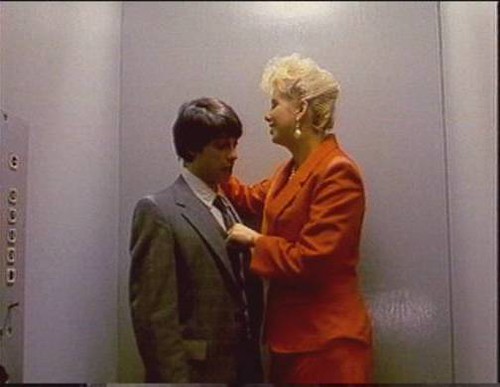
Despite her naïvete, Suzette nevertheless goes to the Stock Exchange, which apparently consists of an Amiga computer shared by four community high school voting booths. Once again, the historical significance of Deep Inside Trading rises to the fore as we get this unparalleled glimpse into “the economy’s” early days. By sleeping with a stock broker in an elevator, she’s able to steal some files, which contain information in code. Jane then sends Georgette (Siobhan Hunter – 10 ½ Weeks) to locate a codebreaker, which she does by sleeping with someone and threatening to send naked polaroids of him to the newspapers. “Do you want your picture on the cover of every newspaper in town?” she asks, once again tragically reminding us of “the economy’s” effects on the newspaper industry. There was a time when polaroids of a naked man that no one even knows would have sold like hotcakes all around the world. These days, we can find naked pictures of men we don’t know on the internet for free. Tragic.
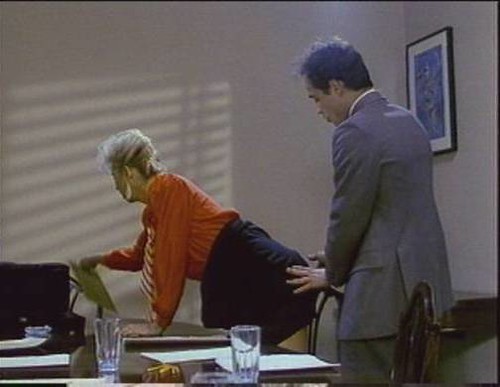
If you need to know how to sexually harrass someone, this is the film for you!
Unfortunately, the codebreaker needs a codebreaker, so Jane sends Suzette to sleep with someone else to read more files. The code, now broken, reveals that in order to catch the culprit (who by now we understand to have done… something) they have to read the files of Irving Boaster, that guy from the first scene, who Jane says has a “computer.” As the film is set in 1984, this “computer” requires an explanation. “In other words,” Jane says, “He has all the information before anyone else does.” This throws illumination on our current economic woes. Everybody now has a computer, so everybody knows everything before everyone else. Ipso facto, nobody knows anything. Insightful… Very insightful.
Suzette and Monica sleep with Irving in order to read his files (although they’re not terribly organized, given that they both sneak away to read the exact same files), and discover that Stella DuBois, also from the first scene, is the one really pulling the strings. Jane gets a friend of hers to seduce Stella with his opulent car phone and illegally get her to sign away all of the stock that she illegally obtained from our heroes. Our final lesson in economics: Two wrongs make a right (the only explanation for all those bailouts).
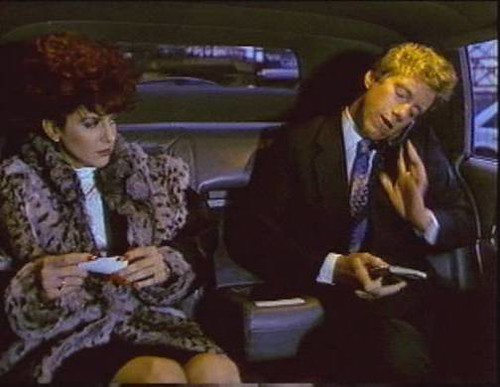
If the plot seems boring to you, then you are wrong and stupid. If I may shift gears from the message to the medium for a moment, Deep Inside Trading has the same inherent structure as Chinatown, or any other “classic” mystery story. A mystery presents itself, forcing a detective (professional or not) to seek information. At first, the information raises more questions, requiring the detective to seek even more information, which then requires the detective to seek more information. In even the best mysteries, this process is repeated ad nauseum. The writer usually tries to make the later attempts to retrieve information more interesting by forcing the protagonist to backtrack after discovering information that contradicts information they had discovered earlier, but ultimately this just means that the hero has to learn more information from a character we’ve already met, which is potentially even less interesting. Deep Inside Trading avoids this obvious pitfall by sprucing up the narrative with hardcore sex instead, making it infinitely better than Chinatown. Therefore, Deep Inside Trading is the greatest mystery movie of all time.
As if any further proof of Deep Inside Trading’s “classic” status was needed, this film about inside trading (deeply) ends with Stella and Irving setting up a Three Card Monte table outside on Wall Street before running from the cops. In the interest of brevity, I’ll just let you assume that I can get three thousand words out of this brilliant metaphor. (Hint: It’s about the economy.)
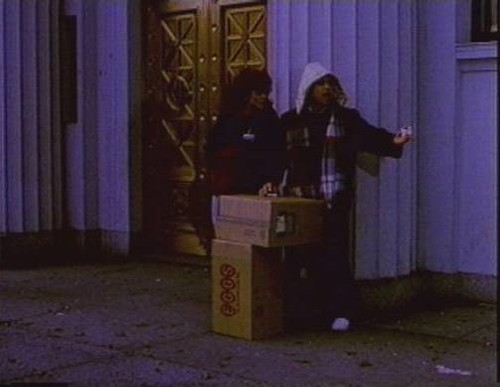
To recap: the economy is bad, and has been bad since the beginning, i.e. the 1980s. The entire system is based on rich white people screwing each other in between screwing everyone else. Industries based on the economy (like detective agencies) would be more effective if they were based on basic human needs, like marital infidelity, so the economy is also particularly bad for the economy. Computers are the source of all economic crime and should therefore be eliminated at all costs, and newspapers are completely screwed even with pictures of anonymous naked men on their covers.
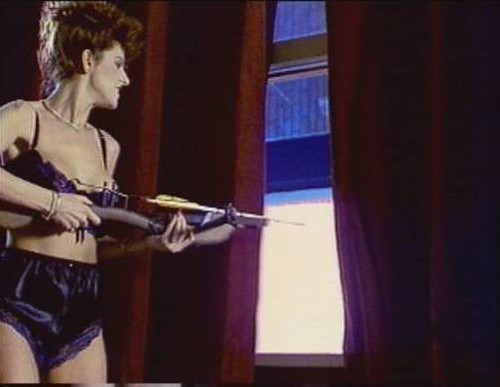
Deep Inside Trading heavily influenced the films of Oliver Stone and is by far the greatest mystery movie ever made. It’s available on DVD from Arrow Productions, and comes highly recommended from Geekscape After Dark.
